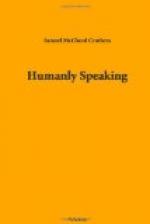“Cogent is not precisely the word I would use. But it seems earnest.”
“Thank you,” said Bagster. “I always try to be earnest. It’s hard to be earnest about so many things. I am always afraid that I may not give to all an equal emphasis.”
“And now that you have stopped for a moment,” I suggested, “perhaps you would be willing to skip to the last page. When I read a story I am always anxious to get to the end. I should like to know how your address comes out,—if it does come out.”
Bagster turned over a dozen pages and read in a more animated manner.
“Your chairman has the reputation of making the meetings over which he presides brisk and crisp. He has given me just a minute and a half in which to tell what the country expects of this Federation of Young People. I shall not take all the time. I ask you to remember two letters—E and N. What does the country expect this Federation to do? E—everything. When does the country expect you to do it? N—now. Remember these two letters—E and N. Young people, I thank you for your attention.
“The hour is late. You, my young brother, have listened to a charge in which your urgent duties have been fearlessly declared to you. When you have performed these duties, others will be presented to you. And now, in token of our confidence in you, I give you the right hand of fellowship.
“And do you know,” said Bagster, “that when I reached to give him the right hand of fellowship, he wasn’t there.”
We sat in silence for some time. At last he asked, hesitatingly, “What do you think of it? In your judgment is it organic or functional?”
“I do not think it is organic. I am afraid that your conscience has been over-functioning of late, and needs a rest. I know a nook in the woods of New Hampshire, under the shadow of Mount Chocorua, where you might go for six months while your affairs are in the hands of a receiver. I can’t say that you would find everything satisfactory, even there. The mountain is not what it used to be. It is decadent, geologically speaking, and it suffered a good deal during the last glacial period. But you can’t do much about it in six months. You might take it just as it is,—some things have to be taken that way.
“You will start to-morrow morning and begin your life of temporary irresponsibility. You will have to give up your problems for six months, but you may rest assured that they will keep. You will go by Portsmouth, where you will have ten minutes for lunch. Take that occasion for a leisurely meal. A card will be handed to you assuring you that ’The bell will ring one minute before the departure of the train. You can’t get left.’ Hold that thought: you can’t get left; the railroad authorities say so.”
“Did you ever try it,” asked Bagster.
“Once,” I answered.
“And did you get left?”
“Portsmouth,” I said, “is a beautiful old town. I had always wanted to see it. You can see a good deal of Portsmouth in an afternoon.”




